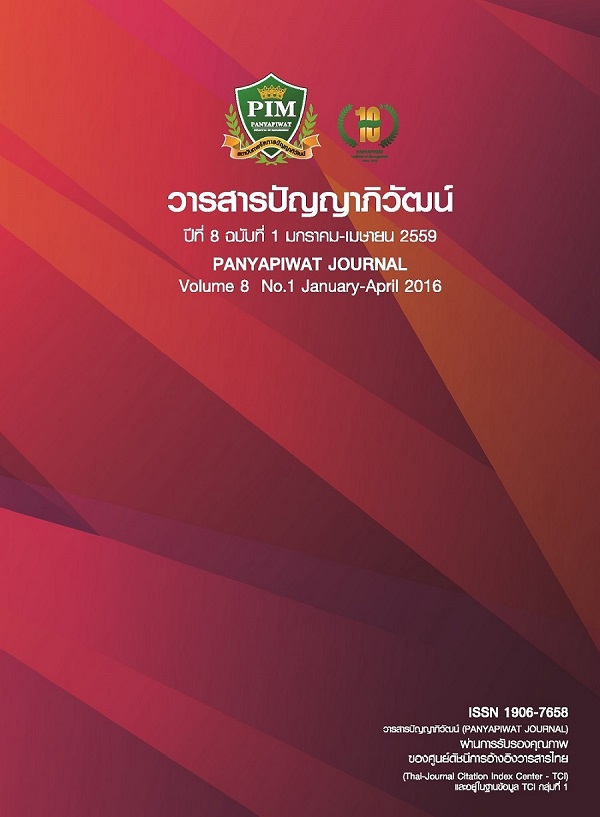คุณลักษณะของชุมชนแห่งการเรียนรู้ทางวิชาชีพในบริบทการศึกษาไทย
Main Article Content
บทคัดย่อ
การวิจัยในครั้งนี้เป็นการวิจัยเชิงคุณภาพ วัตถุประสงค์ในการวิจัยครั้งนี้เพื่อสังเคราะห์แนวคิดและหลักการเกี่ยวกับคุณลักษณะของชุมชนแห่งการเรียนรู้ทางวิชาชีพในบริบทการศึกษาไทย เครื่องมือที่ใช้ในการวิจัยคือ แบบสัมภาษณ์และแบบสังเกต เก็บรวบรวมข้อมูลโดยการสัมภาษณ์แบบไม่เป็นทางการจากผู้มีส่วนได้ส่วนเสีย ประกอบด้วย ผู้อำนวยการโรงเรียน รองผู้อำนวยการโรงเรียน ครู และผู้ปกครอง การสัมภาษณ์แบบเชิงลึกจากผู้ทรงคุณวุฒิทางด้านนโยบายการศึกษา ด้านบริหารสถานศึกษา และนักวิชาการ และการสังเกตแบบไม่มีส่วนร่วมในโรงเรียนที่มีความเป็นเลิศด้านชุมชนแห่งการเรียนรู้ทางวิชาชีพ วิเคราะห์ข้อมูลโดยการวิเคราะห์เนื้อหาด้วยเทคนิคการตรวจสอบสามเส้า
ผลการวิจัยพบว่า คุณลักษณะของชุมชนแห่งการเรียนรู้ทางวิชาชีพในบริบทการศึกษาไทย ประกอบด้วย 5 ประการ ได้แก่ (1) การมีวิสัยทัศน์ ค่านิยม และบรรทัดฐานร่วมกัน (2) การร่วมเรียนรู้และร่วมมือรวมพลัง (3) มุ่งเน้นการเรียนรู้ของผู้เรียนเป็นสำคัญ (4) การสะท้อนผลการปฏิบัติงานทางวิชาชีพ และ (5) ภาวะผู้นำร่วมทางการบริหาร
บทสรุป กล่าวคือ ผลการวิจัยเป็นแนวทางในการพัฒนาโรงเรียนสู่การเป็นชุมชนแห่งการเรียนรู้ทางวิชาชีพในด้านนโยบายการบริหารโรงเรียนตามหลักการกระจายอำนาจการบริหารจัดการเพื่อสร้างครูผู้นำ การพัฒนาวัฒนธรรมของโรงเรียนเพื่อสร้างวัฒนธรรมกัลยาณมิตรทางวิชาการ และการพัฒนาทางวิชาชีพของครูที่มุ่งเน้นการพัฒนาการจัดการเรียนการสอนเพื่อยกระดับผลลัพธ์ทางการเรียนรู้ของผู้เรียนและผลสัมฤทธิ์ทางการเรียนของผู้เรียนอย่างมีประสิทธิผล
The study was a qualitative research with the objective to synthesize concept and principle of characteristics of professional learning communities in Thai educational context. The research instruments were an interview form and an observation form. Data were collected through informal interviews by stakeholders; principals, vice-principals, teachers and parents. The in-dept interviews were collected by educational policy experts, school management experts and scholars. The non-participation observation was at the best practice school of professional learning community. Content analysis was used to analyze the data by triangulation technique.
The research finding showed that five characteristics of professional learning communities in Thai educational context were (1) shared vision, value, and norm; (2) collective learning and collaboration; (3) focus on student learning; (4) professional reflective dialogue; and (5) managerial shared leadership.
The conclusions were the study results would be the guideline for transforming schools into the professional learning communities through developing school management policy which was based on decentralization principle for supporting teacher leaders, developing school culture for creating collegial culture, and developing profession teachers focusing on pedagogy development for enhancing student’s learning outcome and achievement effectively.
Article Details
“ข้าพเจ้าและผู้เขียนร่วม (ถ้ามี) ขอรับรองว่า บทความที่เสนอมานี้ยังไม่เคยได้รับการตีพิมพ์และไม่ได้อยู่ระหว่างกระบวนการพิจารณาลงตีพิมพ์ในวารสารหรือแหล่งเผยแพร่อื่นใด ข้าพเจ้าและผู้เขียนร่วมยอมรับหลักเกณฑ์การพิจารณาต้นฉบับ ทั้งยินยอมให้กองบรรณาธิการมีสิทธิ์พิจารณาและตรวจแก้ต้นฉบับได้ตามที่เห็นสมควร พร้อมนี้ขอมอบลิขสิทธิ์บทความที่ได้รับการตีพิมพ์ให้แก่สถาบันการจัดการปัญญาภิวัฒน์หากมีการฟ้องร้องเรื่องการละเมิดลิขสิทธิ์เกี่ยวกับภาพ กราฟ ข้อความส่วนใดส่วนหนึ่งและ/หรือข้อคิดเห็นที่ปรากฏในบทความข้าพเจ้าและผู้เขียนร่วมยินยอมรับผิดชอบแต่เพียงฝ่ายเดียว”
เอกสารอ้างอิง
กระทรวงศึกษาธิการ. (2557). พระราชบัญญัติการศึกษาแห่งชาติ พ.ศ. 2542 และที่แก้ไขเพิ่มเติม พ.ศ. 2545. สืบค้นเมื่อ 10 กรกฎาคม 2557, จาก http://www.moe.go.th
ณรงค์ฤทธิ์ อินทนาม. (2553). การพัฒนาหลักเทียบสำหรับการสร้างชุมชนการเรียนรู้ทางวิชาชีพในโรงเรียน. วิทยานิพนธ์ปริญญาดุษฎีบัณฑิต, จุฬาลงกรณ์มหาวิทยาลัย.เลขาธิการสภาการศึกษา, สำนักงาน. (2547). มาตรฐานการศึกษา. กรุงเทพฯ: สหายบล็อกการพิมพ์.
________. (2552). ข้อเสนอการปฏิรูปการศึกษาในทศวรรษที่สอง (พ.ศ. 2552-2561). กรุงเทพฯ: บริษัท พริกหวาน กราฟฟิค จำกัด.
________. (2553). แผนการศึกษาแห่งชาติ ฉบับปรับปรุง (พ.ศ. 2552-2559): ฉบับปรับปรุง. กรุงเทพฯ: บริษัท พริกหวานกราฟฟิค จำกัด.
วรลักษณ์ ชูกำเนิด และเอกรินทร์ สังข์ทอง. (2557). โรงเรียนแห่งชุมชนการเรียนรู้ทางวิชาชีพครูเพื่อการพัฒนาวิชาชีพครูที่เน้นผู้เรียนเป็นหัวใจสำคัญ. วารสารวิทยบริการมหาวิทยาลัยสงขลานครินทร์, 25(1), 1-10.
วิจารณ์ พานิช. (2555). วิถีสร้างการเรียนรู้เพื่อศิษย์ในศตวรรษที่ 21. กรุงเทพฯ: มูลนิธิสดศรี-สฤษดิ์วงศ์.
สิริพันธุ์ สุวรรณมรรคา. (2556). การสร้างชุมชนแห่งการเรียนรู้ทางวิชาชีพครู โดยใช้กระบวนการชี้แนะและการเป็นพี่เลี้ยง. สืบค้นเมื่อ 25 พฤษภาคม 2557, จาก http://www.youtube.com/watch?v=aQzyUmQnn_Q
อัมพร ปัญญา. (2557). ปัจจัยที่ส่งผลต่อลักษณะการเป็นองค์กรแห่งการเรียนรู้ในวิทยาลัยราชพฤกษ์. วารสารปัญญาภิวัฒน์, 5(2), 180-190.
Bolam, R. et al. (2005). Creating and sustaining effective professional learning communities. Nottingham: DFES Publications.
Bryk, A., Camburn, E. & Louise, K. S. (1999). Professional learning in Chicago Elementary School: Facilitating Factors and Organizational Consequences. Educational Administration Quarterly,35(1999), 751-781.
Cannata, M. (2007). Teacher Community in Elementary Charter Schools. Education Policy Analysis Archives, 15(11), 1-31.
Cordingly, P., Bell, M., Rundell, B. & Evans, D. (2003). The impact of collaborative CPD on classroom teaching and learning. London: EPPI-Centre, Social Science Research Unit, Institute of Education.
Feger, S. & Arruda, E. (2008). Professional learning communities: Key themes from the literature.United States of America: The Education Alliance, Brown University.
Giles, C. & Hargreaves, A. (2006). The sustainability of innovative schools as learning organizations and professional learning communities during standardized reform. Educational Administration Quarterly, 42(1), 124-156.
Harris, A. & Muijs, D. (2005). Improving Schools Through Teacher Leadership. Berkshire: Open University Press.
Harris, A. (2003). Teacher Leadership as Distributed Leadership. School Leadership and Management, 23(3), 313-324.
Hipp, K. & Huffman, J. (2003). Professional Learning Communities: Assessment-Development-Effects.Paper presented at the meeting of the International Congress for School Effectiveness and Improvement. Sydney: Australia.
Hord, S. M. (1997). Professional learning communities: Communities of continuous inquiry and improvement. Texas: Southwest Educational Development Laboratory.
Kenoyer, F. E. (2012). Case study of professional learning community characteristics in an Egyptian private school. Dotorate’s Degree, Columbia International University.
Leclerc, M., Moreau, A. & Clement, N. (2010). How Schools can Improve their functioning as Professional Learning Communities. European Conference on Education Research 2010, 27 Auhust. Helsinki.
Mathews, L., Holt, C. & Arrambide, M. (2014). Factors Influencing the Establishment and Sustainability of Professional Learning Communities: the Teacher’s Perspective. International Journal of Business and Social Science, 5(11), 23-29.
McLaughlin, M. W. & Talbert, J. E. (2007). Building School Based Teacher Learning Communities: Professional Strategies to Improve Student Achievement. New York: Teachers College Press.
Morrissey, M. S. (2000). Professional Learning Communities: An Ongoing Exploration. Texas: Southeast Educational Development Laboratory.
Mulford, B. & Sallins, H. (2003). Leadership for organizational learning and improved student outcomes: What do we know?. Cambridge Journal of Education,33(2), 175-195.
Newman, F. M. & Associates. (1996). Authentic Achievement: Restructuring Schools for Intellectual Quality. San Francisco: Jossey-Bass.
Scribner, J. P., Cockrell, K. S., Cockrell, H. D. & Valentine, J. W. (1999). Creating Professional Communities in Schools through Organizational Learning: An Evaluation of a School Improvement Process. Educational Administration Quarterly,35(1999), 129-160.
Spillane, J. P. (2006). Distributed leadership. San Francisco: Jossey-Bass.
Stoll, L., Bolam, R., McMahon, A., Wallance, M. & Thomas, S. (2006). Professional learning communities: A review of the literature. Journal of Education Change, 7, 221-258.
Verbiest, E. (2008). Sustainable school development: Professional learning communities. Netherland: Fontys University.
Vescio, V., Ross, D. & Adams, A. (2008). A review of research on the impact of professional learning communities on teaching practice and student learning. Teaching and Teacher Education, 24(2008), 80–91.
Xiao, S. & Saedah, S. (2015). Professional Learning Community in Education: Literature Review. The online journal of Quality in Higher Education, 2(2), 43-56.
Translated Thai References
Chookamnerd, W. & Sungtong, E. (2014). Professional Learning Community of in School for Teacher Professional Development Based on Learner Centered Approach. Academic services Journal Prince of Songkhla University, 25(1), 1-10.[in Thai]
Intanam, N. (2010). Development of A Benchmark for Building Professional Learning Communities in Schools. Doctoral program in educational measurement and evaluation, Chulalongkorn University.[in Thai]
Ministry of Education. (2014). National Education Act of B.E. 2542 (1999) and National Education Act of B.E. 2545 (2002). Retrieved July 10, 2014, from http://www.moe.go.th [in Thai]
Office of Education Council. (2004). Educational Standards. Bangkok: Sahy Block Karn Pim. [in Thai]
_________. (2009). Proposals for the Second Decade of Education Reform (2009-2018). Bangkok: Prik wahn graphic company. [in Thai]
_________. (2010). Education Plan of 2009-2016. Bangkok: Prik wahn graphic company. [in Thai]Panich, V. (2012). Approach for Building Student’s Learning in 21st Century. Bangkok: Sodsri-Saritwong Foundation. [in Thai]
Panya, A. (2014). Factors Affecting Characteristics of Learning Organization in Ratchaphruek College.Panyapiwat Journal,5(2), 180-190. [in Thai]
Suwanmarka, S. (2013). Building Professional Learning Community by Coaching and Mentoring. Retrieved May 25, 2014, from http://www.youtube.com/watch?v=aQzyUmQnn_Q [in Thai]


